Starting a cleaning business in Singapore is a great idea, thanks to the country’s focus on cleanliness. The demand for professional cleaning services is growing. It’s a good time to think about starting your own cleaning business.
It’s important to know the rules and the market before you begin. This guide will help you understand how to start a cleaning company in Singapore. We’ll cover business registration, licenses, and what you need to do to succeed.
If you’re an entrepreneur or just looking for a steady income, the cleaning industry is a good choice. Let’s dive into the steps to get your cleaning business off the ground.
Introduction to Cleaning Businesses in Singapore
The cleaning industry in Singapore has grown a lot, playing a key role in keeping the country clean and healthy. With more people living busy lives, many are choosing to hire professionals for their cleaning needs. This trend makes starting a cleaning business a good opportunity for entrepreneurs.
In this beginner’s guide to cleaning business, it’s important to learn the basics of a successful cleaning business. You need to know the chances and rules that come with this business. Cleaning businesses in Singapore must follow certain rules and have the right qualifications to improve the industry’s professionalism and efficiency.
The cleaning market in Singapore is booming, thanks to supportive rules. With ongoing training and easy-to-understand licensing, new business owners can easily start in this exciting field.
Why Start a Cleaning Business in Singapore?
Starting a cleaning business in Singapore offers many opportunities in the cleaning industry. The country values cleanliness highly, making it always in demand. This means there’s a steady need for cleaning services in homes and businesses. Starting a business here is easy, thanks to a low entry barrier.
This industry can be very profitable if managed well. It rewards those who run it efficiently.
The COVID-19 pandemic made people more aware of the importance of cleanliness. This has led to more businesses and homes hiring cleaning services. It’s a great chance for new cleaning businesses to grow.
There’s also a chance to specialize in eco-friendly cleaning. This appeals to customers who care about the environment.
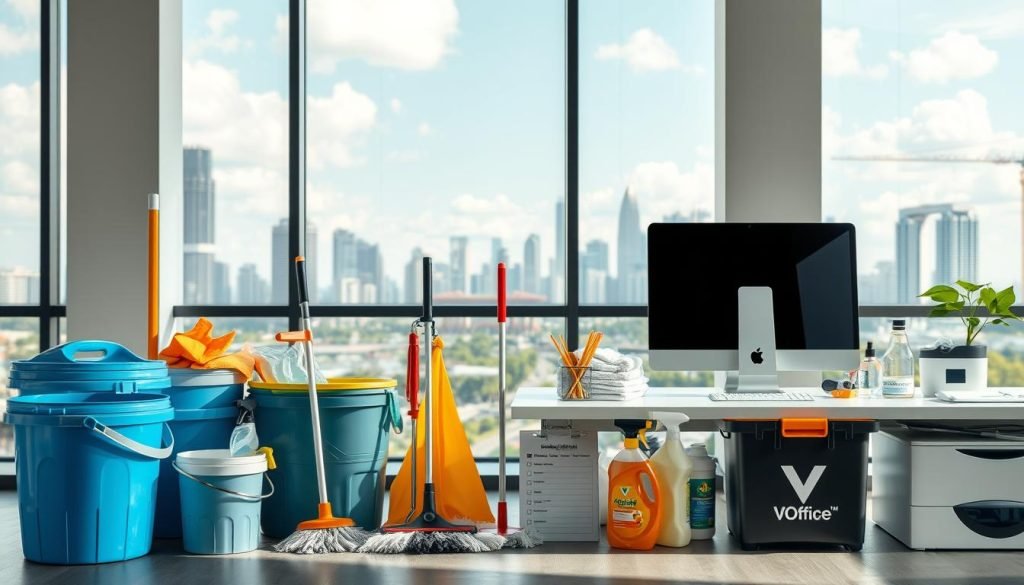
When starting a cleaning business, it’s key to follow some important tips for starting a cleaning business. First, do your market research to find your target market and what they need. Then, make a detailed business plan that includes your finances.
You also need to know the legal steps, like getting a Cleaning Business Licence from the National Environment Agency. It’s valid for a year. Following safety rules and quality standards is crucial for a good reputation. Starting a cleaning business in Singapore can lead to growth and profits in a vital industry.
What Is a Cleaning Business?
A cleaning business in Singapore offers services to keep places clean and hygienic. It’s important to know the cleaning services definition if you’re thinking about starting one. These businesses come in many types, each serving different needs and places.
The main types of cleaning services are:
- Residential cleaning
- Commercial cleaning
- Specialized cleaning (carpet cleaning, window cleaning)
- Janitorial services
- Event cleaning
- Outdoor cleaning
In Singapore, you need a cleaning business license to start. This rule started in September 2014 to improve work standards. From January 1, 2024, there will be new rules to follow. Following these rules is important to avoid fines and other penalties.
The types of cleaning businesses fall into three main areas: Office and Commercial, Food and Beverage, and Conservancy. If you clean without a license, you could face fines up to $10,000, jail for 12 months, or both. You could also get fined every time you break the rules.
If you want to start a cleaning business in Singapore, you need to know the rules and get a license. Following the rules helps your business run well and keeps places clean and healthy.
| License Class | Eligibility Criteria | Minimum Paid-Up Capital | Renewal Process |
|---|---|---|---|
| Class 1 | Comprehensive background and training | At least $250,000 | 90 days before expiry |
| Class 2 | Standard compliance requirements | At least $25,000 | 90 days before expiry |
| Class 3 | New businesses meeting initial requirements | N/A | Up to 2 years to upgrade |
Following these rules will help you build a successful cleaning business. It will meet the needs of the community and follow the law.
Market Research and Planning
Before starting a cleaning business, it’s key to do thorough market research. This helps you understand the local market and shape your services and marketing. For example, census data shows how many households are in certain areas. This info helps you focus your marketing to reach more people.
Joining trade groups like the National Cleaning Contractors Association (NCCA) gives you access to important surveys and reports. Knowing your competitors is also crucial for success. Websites, local guides, and newspapers can help you find out where you can stand out.
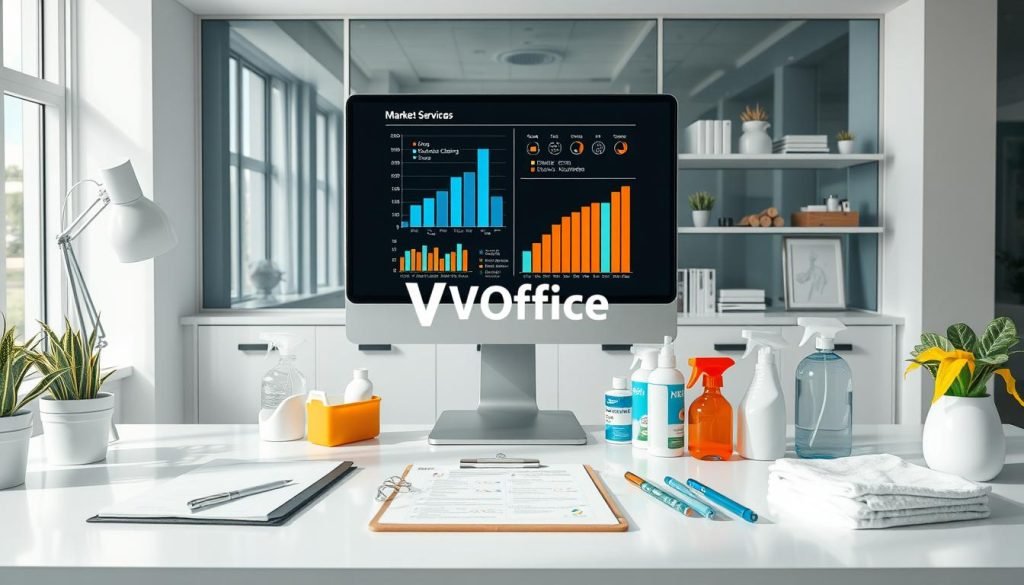
Using tools like Facebook Polls or LinkedIn surveys can be a cheap way to get customer feedback. A SWOT analysis can also help by pointing out your strengths, weaknesses, and what’s happening outside your business. This helps you plan better based on what people in your area want.
Market research is key to making a cleaning business grow and make money. Using what you learn from research helps you make smarter choices. About 70% of new cleaning businesses are LLCs or corporations. This setup helps them run smoothly and gain trust from clients.
There are different ways to price your cleaning services, like by the hour, a flat fee, or by the size of the area. Commercial cleaning often needs special gear, and you might work when most people are out. For cleaning homes, you need to pay more attention to details.
Having a varied marketing plan helps draw in more customers. Use Nextdoor to reach out to homeowners and talk to property managers for commercial clients. Make sure you have all the right licenses and insurance, like a general business license and liability insurance. A CRM program can help you keep track of clients, send invoices, and remember their needs.
Steps for Starting a Cleaning Business
Starting a cleaning business takes several key steps for success. Identifying your target market is a big part of this. Knowing who will use your services helps you make your services and marketing better.
Identify Your Target Audience
First, find out who your customers will be. Think about things like:
- Age groups
- Income levels
- Lifestyles
These things affect what kind of cleaning people need. Busy people might want regular cleanings. Families with kids might want a deeper clean. Focusing on one group lets you offer services just for them.
Research Competition and Niche Areas
After finding your market, check out the competition. Look at what they offer, their prices, and what customers say about them. This helps you see where you can stand out.
- Eco-friendly cleaning
- Post-construction cleaning
- Specialized services like carpet cleaning
Each niche can draw in different customers and make more money. Knowing what’s popular in cleaning helps you plan better.
Use online surveys and customer feedback to learn more. This info helps you position your business well in the cleaning industry. Remember, the right steps at the start can really help your business do well.
Business Registration and Licensing
Starting a cleaning business in Singapore means you need to know how to register your business and get the right licenses. It’s crucial to follow local laws to run your business well and be seen as trustworthy. This is key in a competitive field.
Register Your Cleaning Business with ACRA
The first thing to do is register with the Accounting and Corporate Regulatory Authority (ACRA). You need to pick a business type, like being a sole owner or a partnership, and choose a unique name. This makes your cleaning business official and lets you legally work in Singapore.
Necessary Licenses and Permits for Cleaning Businesses
You must get a cleaning business license from the National Environment Agency (NEA) to operate. This applies to different cleaning areas, like Office and Commercial Cleaning, Food and Beverage Cleaning, and Conservancy Cleaning. Here are some important details about getting a license:
- The Cleaning Business License costs $130 and lasts one year.
- It usually takes about 30 working days to process your application.
- You can renew your license up to 90 days before it expires through GoBusiness Licensing.
There are different licenses for various cleaning services, each with its own rules. For instance, a Class 1 License needs at least $250,000 in paid-up capital. You must also show proof of cleaning contracts or experience when applying or renewing your license.
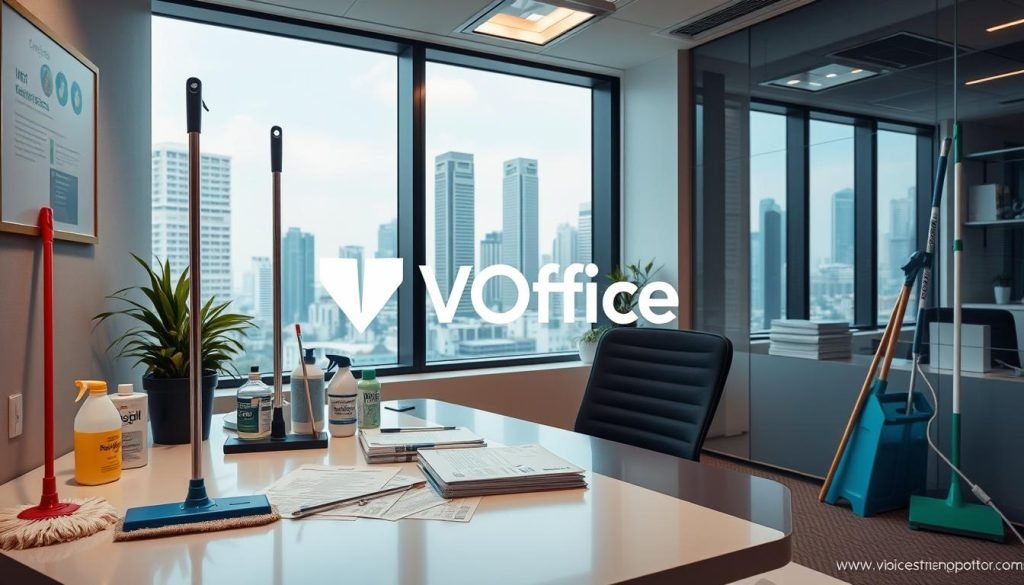
Keeping up with training and meeting compliance standards is key for top-notch cleaning services. Following these rules helps keep your business accountable and ensures quality. This is good for public health and safety.
Starting a Cleaning Business: Creating a Business Plan
Starting a cleaning business is more than just having a broom and mop. A detailed cleaning business plan is key to success. It outlines your vision, targets the right market, and covers pricing and financials.
Deciding between residential and commercial cleaning affects your business path. Each type requires different skills and strategies. Specializing in services like carpet cleaning can draw in clients by building trust and credibility.
Financial planning is crucial for cleaning services. You need to figure out costs for supplies, transport, and ads. Knowing your expenses helps with budgeting and setting prices. Don’t forget to plan for hiring staff and workers’ compensation insurance.
Choosing a business name is important for brand recognition and reputation. A simple, memorable, and unique name can help set your business up for success.
Deciding on a business structure is key. You can choose from sole proprietorship, partnership, or LLC, each with different legal and tax implications. This choice affects how you run your business daily.
A good business plan helps organize your thoughts and secure funding. It shows lenders your business’s growth and profit potential. A detailed market analysis helps understand trends and competition.
As your business grows, updating your plan regularly is important. This keeps it relevant to your operations. It helps you stay adaptable and true to your business vision.
| Business Plan Element | Description | Importance |
|---|---|---|
| Executive Summary | A concise overview of the business plan, detailing mission, goals, and competitive advantages. | Provides a quick reference for stakeholders. |
| Market Analysis | Research on industry trends, target markets, and local competition. | Helps define the ideal customer profile. |
| Startup Summary | Breakdown of initial costs, equipment needs, and asset evaluation. | Crucial for financial planning and funding applications. |
| Company Overview | Details on daily operations, types of services, and service frequencies. | Clarifies business functionality for stakeholders. |
| Business Structure | Explanation of chosen structure (e.g., LLC, sole proprietorship). | Impacts taxes and liability protection. |
Insurance and Bonding for Your Cleaning Business
Starting a cleaning business needs careful planning, especially with insurance for cleaning business and bonding. These steps protect your business and gain trust with clients. Without insurance, you could face big financial risks from accidents or lawsuits.
General liability insurance is a key type, costing less than $45 a month or about $530 a year. It covers injuries, damage, and copyright issues. Cleaning work comes with a lot of accident risks, so this insurance is crucial.
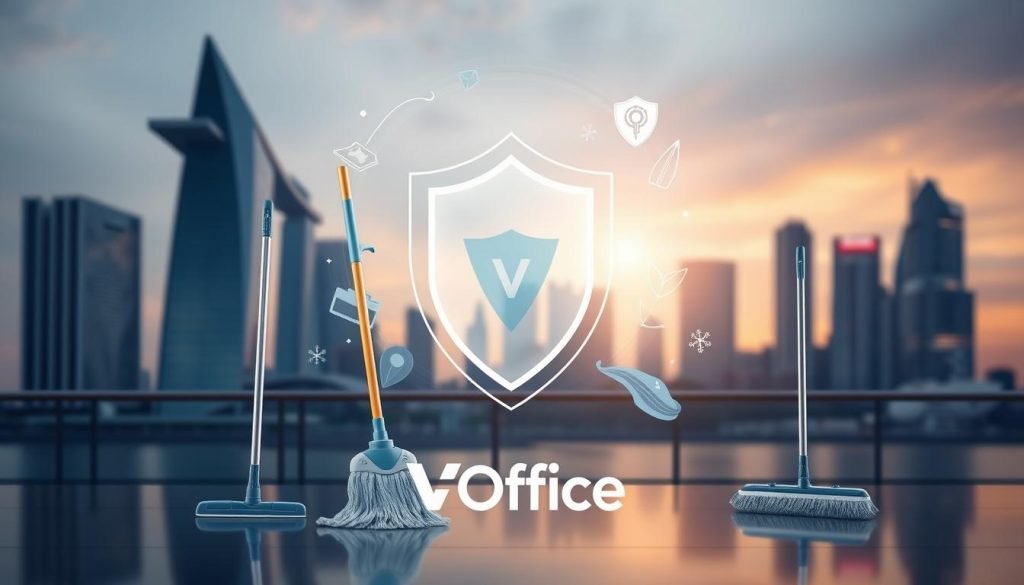
Don’t forget about bonding. A janitorial service bond protects customers from theft or dishonest acts by employees. It costs around $8 a month. Bonds help reduce risks and make you look more trustworthy in the industry.
Workers’ compensation insurance is also vital, costing between $2,000 to $6,700 a year. It covers injuries your employees might get at work. Business owner’s policies start at $55 a month, offering liability and property coverage.
In summary, knowing about insurance and bonding is key for your cleaning business’s success. Having these protections lets you focus on your work without worrying about risks.
Investing in Cleaning Equipment and Supplies
Starting a cleaning business means thinking about what equipment and supplies you need. These items are key to how well and how good your services are. Having a list of must-haves can guide newbies and meet what clients want.
Essential Equipment and Supplies Checklist
Here’s a list of the must-have supplies for your cleaning business:
- Vacuum Cleaners: Get high-quality vacuums for different floors like carpets and hardwood.
- Carpet Extractors: These are a must for keeping carpets clean at home.
- Cleaning Carts: Use carts to carry your cleaning stuff and make things easier to move around.
- Disinfectant Cleaners: Use strong cleaners for places that need to be really clean, like offices.
- Squeegees and Extension Poles: These are needed for cleaning windows without leaving streaks.
- High-Quality Uniforms: Wearing uniforms or aprons with your logo makes your team look professional and boosts your brand.
- Safety Equipment: Gloves, masks, and goggles keep your team safe while they work.
- Paper Supplies: Keep your cleaning jobs complete with things like paper towels and toilet paper.
When planning your budget for cleaning gear, think about the upfront cost and how much upkeep it will need. It’s smart to pick top-quality items that follow industry rules. This way, you get things that last a long time and make your clients happy. Buying supplies in big quantities can also save you money.
Focus on the right equipment and supplies for your cleaning business to improve your service and build trust with clients. Making smart choices is key to a successful business in this field.
Hiring and Training Staff for Your Cleaning Business
Building a strong team is key to your cleaning business’s success in Singapore. Look for qualities like being on time, dependable, fit, and detail-oriented when hiring cleaners. A detailed screening process helps find candidates who are skilled, trustworthy, and committed.
A clear job description is crucial in the hiring process. List tasks such as cleaning areas, emptying trash, and restocking supplies. Mention requirements like a high school diploma, cleaning experience, and handling cleaning products. This way, you draw in applicants who fit the job well.
Using different ways to promote your job openings helps reach more people. Job boards, social media, and employee referrals are good options. Short job posts get more attention, so make sure to include key details like job title, duties, pay range, and how to apply.
Training your cleaning staff is very important. Teach them how to clean properly, follow safety rules, and provide good customer service. It’s also key to follow local laws. Regular training keeps staff up-to-date with the latest cleaning methods and high service standards.
As your business grows, managing your team well becomes more critical. Use systems to track who shows up on time. Tools like GPS and face recognition help with this, making sure staff are where they should be. Focus on hiring and training well to create a team that meets your clients’ expectations.
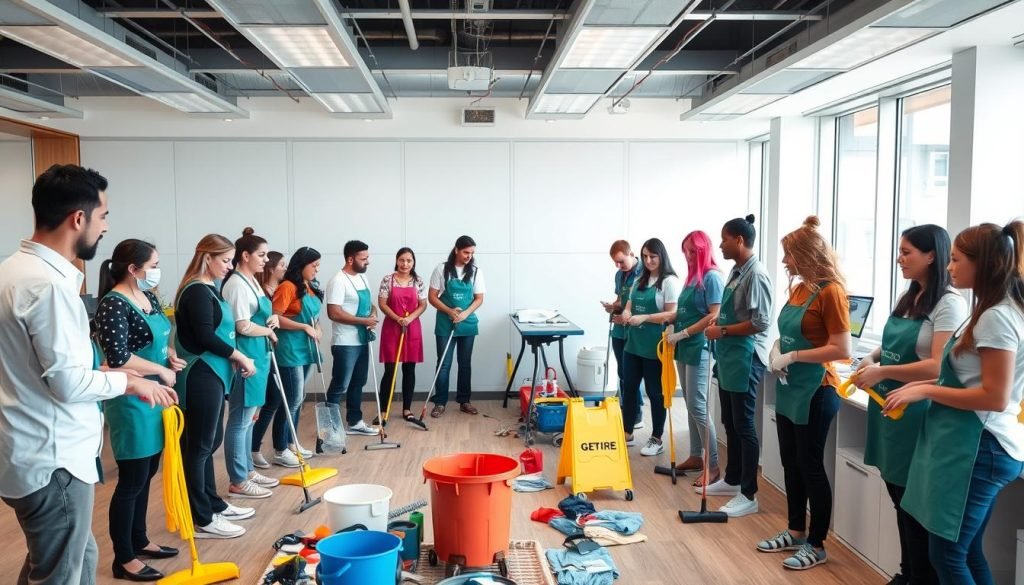
Marketing Your Cleaning Business in Singapore
In Singapore’s competitive cleaning industry, having a strong cleaning business marketing plan is key. A good online presence is vital for promoting your services. A well-made website helps show what you offer and builds trust with potential clients. It also makes it easier for people to find you on search engines.
Social media like Facebook and Instagram are great for promoting cleaning services. Posting customer reviews, service details, and cleaning tips can grow your audience. This kind of content starts conversations, making people more likely to remember your brand and reach out to you.
Using digital marketing tools like SEO can really help. Adding the right keywords to your website can improve your search rankings. Pay-per-click ads (PPC) can also bring more people to your site, especially for special deals or services.
But don’t forget about traditional marketing. Flyers, banner ads, and newspaper ads can still get your message to local people. Big companies can even use billboards to get noticed in busy places.
Working with local businesses can also boost your image and reach more people. Partnering with real estate agents and property managers can lead to steady referrals. Using the right marketing mix helps your business grow and connect with the right people.
Conclusion
Starting a cleaning business in Singapore is a great chance, thanks to the high demand and low start-up costs. It’s key to plan well and do your market research. This helps you spot market gaps and understand what people need.
Registering your business lets you get discounts from suppliers, which boosts your profits. It’s also vital to offer top-notch cleaning services. This builds your reputation.
Invest in training your staff and use tech like scheduling software. This makes your business run smoother and meets your customers’ needs. Putting profits back into your business helps it grow and prepares you for bigger things like expansion or franchising.
Use these tips to start your cleaning business journey. Stay flexible, keep trying, and always look for ways to get better. With Singapore’s growing cleaning industry, your hard work could lead to great success and happy customers.
FAQ
What are the essential steps to start a cleaning business in Singapore?
How can I conduct market research for my cleaning business?
What types of cleaning services can I offer?
What licenses do I need to operate a cleaning business?
How important is having a business plan for a cleaning startup?
What types of insurance should I consider for my cleaning business?
Which marketing strategies are effective for a cleaning business?
How can I find reliable staff for my cleaning business?
Source Links
- https://www.sbsgroup.com.sg/blog/register-cleaning-company-in-singapore-to-rejoice-entrepreneurship/
- https://www.amazon.sg/How-start-cleaning-business-Residential/dp/B09189JKPM
- https://www.nea.gov.sg/our-services/public-cleanliness/cleaning-industry/cleaning-business-licence/enhanced-training-requirement
- https://www.singaporebrand.com.sg/blog/what-do-i-need-to-operate-a-small-cleaning-business-in-singapore/
- https://www.mom.gov.sg/newsroom/press-releases/2014/licensing-of-cleaning-businesses-starts-on-1-april-2014
- https://emas.org.sg/wp-content/uploads/2019/07/Cleaning-Business-Licence-FAQ.pdf
- https://heysara.sg/how-to-start-a-cleaning-business-in-singapore/
- https://www.3ecpa.com.sg/resources/industry-guide/starting-a-cleaning-business-in-singapore/
- https://www.nea.gov.sg/our-services/public-cleanliness/cleaning-industry/cleaning-business-licence
- https://www.nea.gov.sg/our-services/public-cleanliness/cleaning-industry/cleaning-business-licence/cleaning-business-licence-faq
- https://www.singaporebrand.com.sg/blog/how-to-start-a-cleaning-company-at-my-house-in-singapore/
- https://godigitool.com/market-research-cleaning-business/
- https://www.forbes.com/advisor/business/start-a-cleaning-business/
- https://insights.workwave.com/industry/cleaning-services/how-to-start-a-cleaning-business/
- https://connecteam.com/tips-start-cleaning-business/
- https://coursemology.sg/blog/how-to-apply-for-cleaning-business-license-in-singapore/
- https://www.gobusiness.gov.sg/browse-all-licences/National-Environment-Agency-(NEA)/Cleaning-Business-Licence
- https://www.insureon.com/blog/how-to-start-a-cleaning-business
- https://www.serviceautopilot.com/cleaning/how-to-create-cleaning-business-plan/
- https://www.nerdwallet.com/article/small-business/how-to-start-a-cleaning-business
- https://www.nerdwallet.com/article/small-business/insurance-and-bonding-for-cleaning-businesses
- https://www.taskbird.com/blog/commercial-cleaning/insured-and-bonded-cleaning-services
- https://www.method.me/blog/what-you-need-to-start-a-cleaning-business/
- https://cpdonline.co.uk/knowledge-base/health-and-safety/equipment-needed-for-cleaning-business/
- https://www.insurancecanopy.com/blog/supplies-for-cleaning-business
- https://www.toplinepro.com/blog/how-to-hire-employees-for-cleaning
- https://connecteam.com/e-how-to-hire-cleaning-staff/
- https://truein.com/cleaning-janitorial-business-hiring/
- https://www.wealthbridgecs.com/sg-guide/starting-a-cleaning-company
- https://www.oom.com.sg/seo-sem-how-to-market-your-cleaning-company-in-singapore/
- https://www.singaporebrand.com.sg/blog/what-do-i-need-to-start-a-cleaning-business-in-singapore/
- https://joinhomebase.com/blog/how-to-start-a-successful-house-cleaning-business-in-6-steps/
- https://www.easy-expense.com/blog/how-to-start-a-cleaning-business.html
- https://www.singaporesetupcompany.com/blog/creating-a-cleaning-business-in-singapore/

